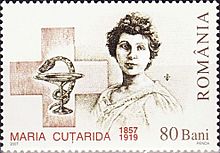Maria Cuțarida-Crătunescu facts for kids
Maria Cuțarida-Crătunescu (born February 10, 1857 – died November 16, 1919) was a very important person in Romanian history. She was the first female doctor in Romania. She also worked hard to support women's rights and helped many children and mothers.
Contents
Early Life and Education
Maria was born in a town called Călărași. She went to the Central School for Girls in Bucharest, which was a good school. After finishing there, she wanted to become a doctor.
In 1877, she started studying medicine at the University of Zurich in Switzerland. It was a bit hard for her because of the language. So, she moved to the University of Montpellier in France to continue her studies. She did her first big research project there.
Becoming a Doctor
Maria then moved to Paris to finish her medical training and work in hospitals. She became a doctor in 1884. She graduated with "magna cum laude," which means "with great honor." This shows she was a brilliant student!
After becoming a doctor, Maria wanted to work in a special department for "Diseases of Women" at a hospital in Romania. But she was not allowed to, and no one told her why. Instead, she became a professor who taught about hygiene (how to stay clean and healthy).
Later, in 1886, she became the head of the hygiene department at a place called "Elena Lady" asylum. By 1891, she was the head of the gynecology department at Filantropia Hospital in Bucharest. Gynecology is the branch of medicine that deals with women's health.
Helping Mothers and Children
Maria Cuțarida-Crătunescu cared a lot about helping others. In 1897, she started a group called the Maternal Society. This group helped poor children and their mothers.
She also organized the first crèche in Romania in 1899. A crèche is a place where babies and young children are looked after while their parents are at work. This was a big step forward for families in Romania.
Maria was invited to important meetings in other countries, like Brussels (in 1907) and Copenhagen (in 1910). There, she talked about how Romania was working to reduce the number of babies who died young. She also shared her research on nurseries in Romania.
Supporting Women's Rights
Maria was a strong supporter of women's rights, also known as a feminist. She believed that women should have the same opportunities as men. In 1900, she went to a big meeting in Paris. There, she presented a paper called Work of Women in Romania. This paper talked about the important intellectual work that Romanian women were doing.
Later Life
During World War I, Maria continued to help people. She worked as a doctor in a military hospital. After the war, she stopped working, probably because of her health. Maria Cuțarida-Crătunescu passed away in Bucharest in 1919. She left behind a legacy as a pioneer in medicine and a champion for women and children in Romania.
See also
 In Spanish: Maria Cuțarida-Crătunescu para niños
In Spanish: Maria Cuțarida-Crătunescu para niños


